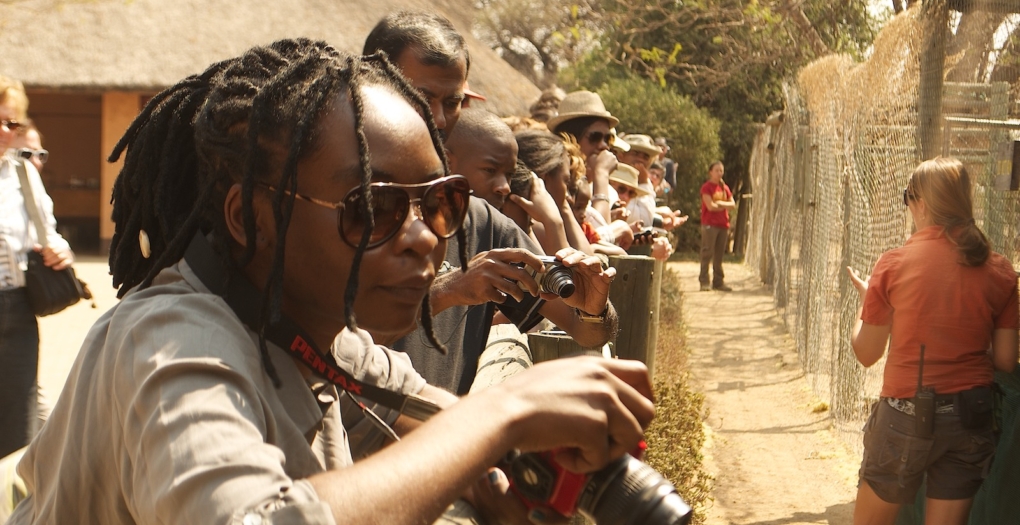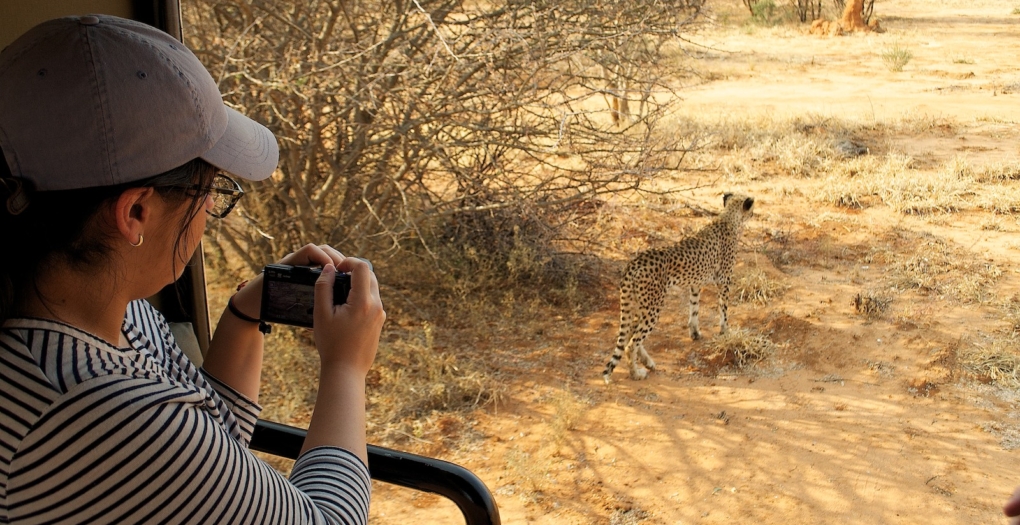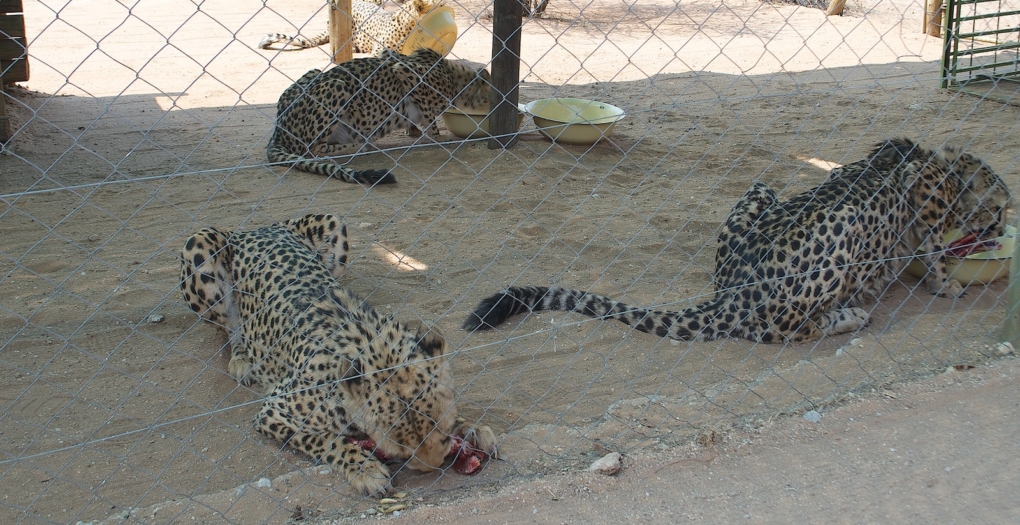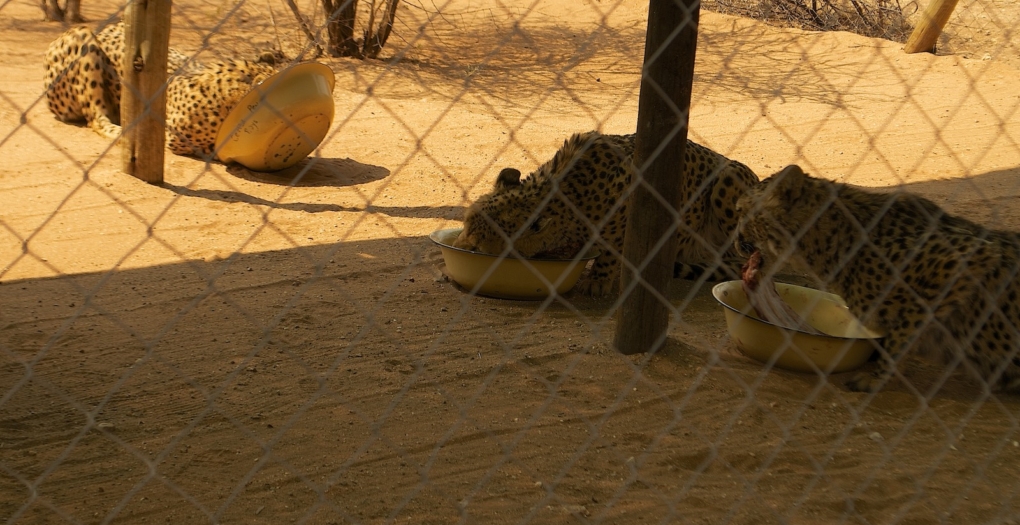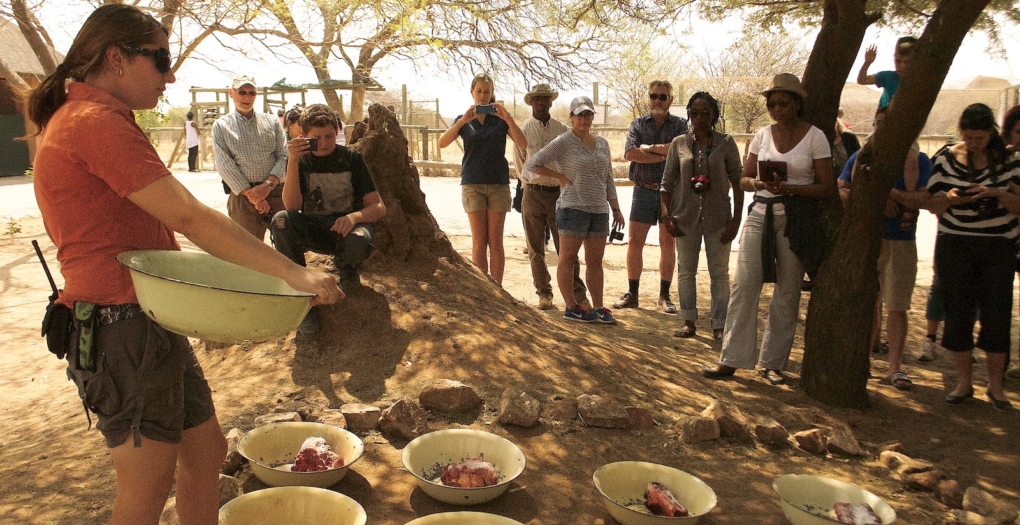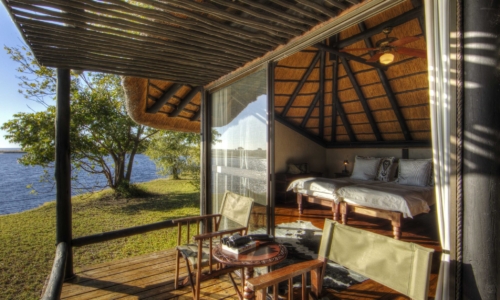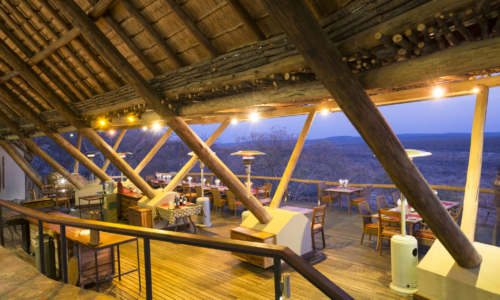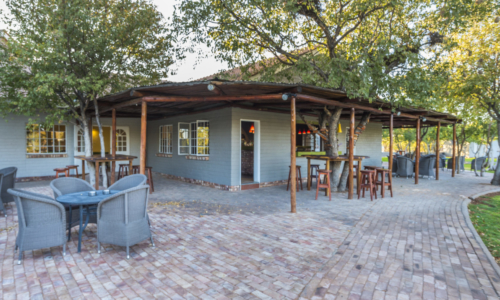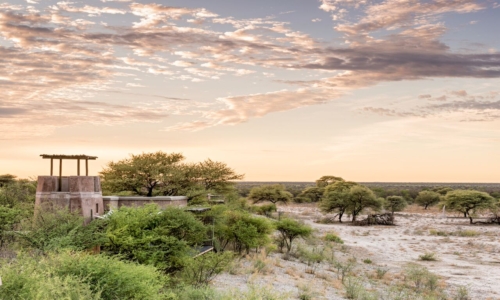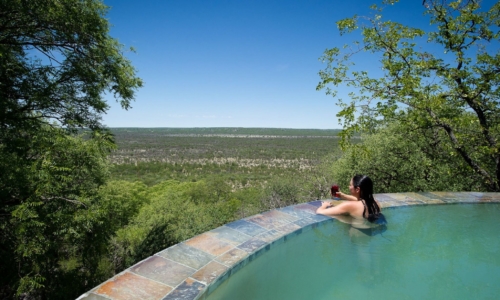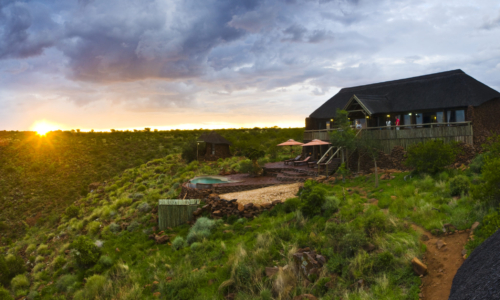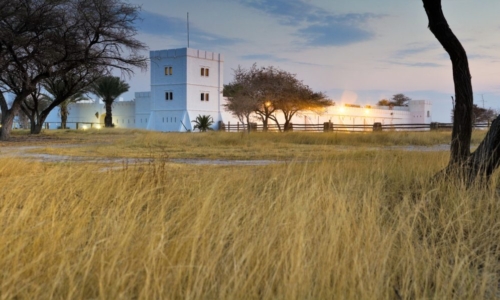About three hours north of the capital city of Windhoek, the CCF’s International Research and Education Center is a renowned research facility as well as an eco-tourism destination. Travelers enjoy a memorable and informative experience here and can visit for a day or even stay overnight at the exclusive Babson House luxury guest house which sleeps up to six people. Because the cheetah is quite different from all other cats and is the only member of its genus, Acinonyx, research and conservation efforts are vital to keeping these endangered cats safe. The cheetah’s long legs and slender body enable it to reach great speeds.
The Education Center is open daily from eight to five and includes a range of activities available to visitors. There are guided tours of the center and museum for closer insight to the research performed here. The displays are designed around CCF’s scientific research findings and provide detailed information about the cheetah: its history, physiology, importance within the ecosystem, conflict with humans, and what CCF is doing to ensure the species’ survival for future generations. The CCF children’s educational playground makes learning about conservation fun. Visiting kids can complete a range of activities designed to demonstrate cheetah physiology and environmental issues.
Of course, one of the biggest draws to the education center are the cheetahs themselves. The CCF takes in orphaned and injured cheetahs and provides them with a peaceful sanctuary. These cheetahs, not able to make it in the wild due to behavioral or medical problems, are part of ongoing research to better understand cheetah biology, physiology, and behavior. Some of these beautiful orphaned cheetahs can be seen either at feeding times at 2:00 on weekdays and noon on weekends. In addition to which, they can also be viewed up close on the Cheetah Safari Drive. The Cheetah Run lets guests watch these magnificent runners stretch their legs and run like the wind since these fast cats can reach up to sixty miles an hour. They can also be spotted, spots and all in their natural habitat in CCF’s Bellebenno Reserve.
Private safaris are conducted on the CCF’s own Little Serengeti, a scenic open plain featuring large herds of hartebeest, oryx, springbok, warthog, and jackals. For a unique personal experience, the cheetah exclusive lets visitors enjoy a one on one encounter with an ambassador cheetah and the research staff.
Also found at the Education Center is the Model Farm and Creamery which includes several model farms set up to display predator-friendly and commercially viable livestock and wildlife programs. It’s the perfect way to show visiting groups and farmers that cheetahs and farmers can co-exist peacefully. The Dancing Goat Creamery makes goat cheese from the resident herd which are protected by its Anatolian Shepherds and Kangal Livestock Guarding Dogs.

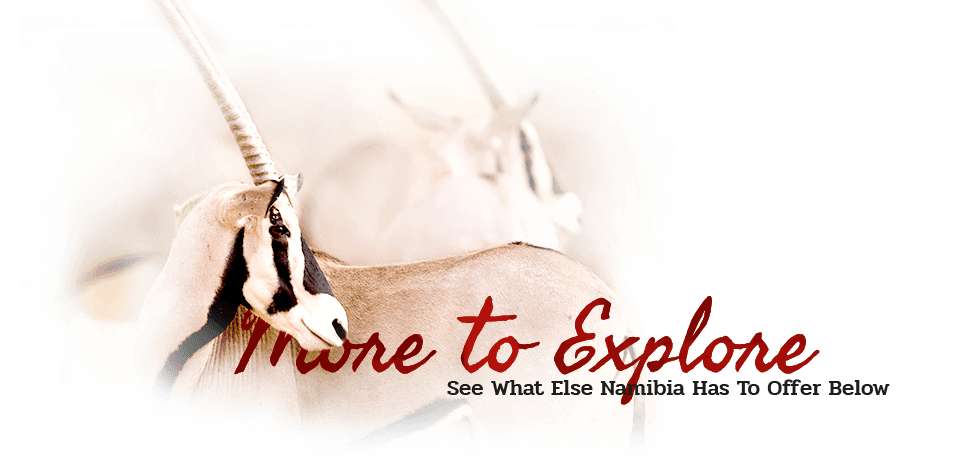
- Anderssons at Ongava
- Babson House
- Camp Kipwe
- Canyon Lodge
- Canyon Roadhouse
- Canyon Village
- Cape Cross Lodge
- Chobe Savanna Lodge
- Damara Mopane Lodge
- Damaraland Camp
- Dead Valley Lodge
- Desert Hills Glamping Camp
- Desert Homestead
- Desert Homestead Outpost
- Desert Rhino Camp
- Dolomite Camp
- Doro Nawas Camp
- Eagle’s Nest Lodge
- Erongo Wilderness Lodge
- Etosha Heights Safari House
- Etosha Mountain Lodge
- Etosha Safari Camp
- Etosha Safari Lodge
- Fish River Lodge
- Fort Sesfontein Lodge
- Grootberg Lodge
- Halali Camp
- Hoanib Skeleton Coast Camp
- Hoanib Valley Camp
- Ichingo Chobe River Lodge
- Kalahari Anib Lodge
- Kalahari Farmhouse
- Khorixas Rest Camp
- Kulala Desert Lodge
- Kwessi Dunes
- Little Kulala
- Little Ongava
- Malansrus Tented Camp
- Mowani Mountain Camp
- Mushara Bush Camp
- Mushara Lodge
- Mushara Outpost
- Naankuse Lodge
- Namib Desert Lodge
- Namushasha River Lodge
- Namutoni Camp
- Nhoma Safari Camp
- Okahirongo Elephant Lodge
- Okahirongo River Camp
- Okaukuejo Camp
- Okonjima Bush Camp
- Okonjima Bush Suite
- Okonjima Grand African Villa
- Okonjima Plains Camp
- Onduli Ridge
- Ongava Lodge
- Ongava Tented Camp
- Onguma Bush Camp
- Onguma Etosha Aoba Lodge
- Onguma Tented Camp
- Onguma The Fort
- Onguma Tree Top Camp
- Onkoshi Camp
- Ozondjou Trails
- Popa Falls Camp
- River Crossing Lodge
- Safarihoek Lodge
- Serra Cafema Camp
- Shipwreck Lodge
- Sossus Dune Lodge
- Sossusvlei Desert Lodge
- Terrace Bay Camp
- Teufelskrallen Tented Lodge
- Villa Mushara
- Wolwedans Boulders Safari Camp
- Wolwedans Dune Camp
- Wolwedans Dunes Lodge
- Wolwedans Mountain View Suite
- Wolwedans Private Camp
- Anderssons at Ongava
- Babson House
- Camp Kipwe
- Canyon Lodge
- Canyon Roadhouse
- Canyon Village
- Cape Cross Lodge
- Chobe Savanna Lodge
- Damara Mopane Lodge
- Damaraland Camp
- Dead Valley Lodge
- Desert Hills Glamping Camp
- Desert Homestead
- Desert Homestead Outpost
- Desert Rhino Camp
- Dolomite Camp
- Doro Nawas Camp
- Eagle’s Nest Lodge
- Erongo Wilderness Lodge
- Etosha Heights Safari House
- Etosha Mountain Lodge
- Etosha Safari Camp
- Etosha Safari Lodge
- Fish River Lodge
- Fort Sesfontein Lodge
- Grootberg Lodge
- Halali Camp
- Hoanib Skeleton Coast Camp
- Hoanib Valley Camp
- Ichingo Chobe River Lodge
- Kalahari Anib Lodge
- Kalahari Farmhouse
- Khorixas Rest Camp
- Kulala Desert Lodge
- Kwessi Dunes
- Little Kulala
- Little Ongava
- Malansrus Tented Camp
- Mowani Mountain Camp
- Mushara Bush Camp
- Mushara Lodge
- Mushara Outpost
- Naankuse Lodge
- Namib Desert Lodge
- Namushasha River Lodge
- Namutoni Camp
- Nhoma Safari Camp
- Okahirongo Elephant Lodge
- Okahirongo River Camp
- Okaukuejo Camp
- Okonjima Bush Camp
- Okonjima Bush Suite
- Okonjima Grand African Villa
- Okonjima Plains Camp
- Onduli Ridge
- Ongava Lodge
- Ongava Tented Camp
- Onguma Bush Camp
- Onguma Etosha Aoba Lodge
- Onguma Tented Camp
- Onguma The Fort
- Onguma Tree Top Camp
- Onkoshi Camp
- Ozondjou Trails
- Popa Falls Camp
- River Crossing Lodge
- Safarihoek Lodge
- Serra Cafema Camp
- Shipwreck Lodge
- Sossus Dune Lodge
- Sossusvlei Desert Lodge
- Terrace Bay Camp
- Teufelskrallen Tented Lodge
- Villa Mushara
- Wolwedans Boulders Safari Camp
- Wolwedans Dune Camp
- Wolwedans Dunes Lodge
- Wolwedans Mountain View Suite
- Wolwedans Private Camp

About three hours north of the capital city of Windhoek, the CCF’s International Research and Education Center is a renowned research facility as well as an eco-tourism destination. Travelers enjoy a memorable and informative experience here and can visit for a day or even stay overnight at the exclusive Babson House luxury guest house which sleeps up to six people. Because the cheetah is quite different from all other cats and is the only member of its genus, Acinonyx, research and conservation efforts are vital to keeping these endangered cats safe. The cheetah’s long legs and slender body enable it to reach great speeds.
The Education Center is open daily from eight to five and includes a range of activities available to visitors. There are guided tours of the center and museum for closer insight to the research performed here. The displays are designed around CCF’s scientific research findings and provide detailed information about the cheetah: its history, physiology, importance within the ecosystem, conflict with humans, and what CCF is doing to ensure the species’ survival for future generations. The CCF children’s educational playground makes learning about conservation fun. Visiting kids can complete a range of activities designed to demonstrate cheetah physiology and environmental issues.
Of course, one of the biggest draws to the education center are the cheetahs themselves. The CCF takes in orphaned and injured cheetahs and provides them with a peaceful sanctuary. These cheetahs, not able to make it in the wild due to behavioral or medical problems, are part of ongoing research to better understand cheetah biology, physiology, and behavior. Some of these beautiful orphaned cheetahs can be seen either at feeding times at 2:00 on weekdays and noon on weekends. In addition to which, they can also be viewed up close on the Cheetah Safari Drive. The Cheetah Run lets guests watch these magnificent runners stretch their legs and run like the wind since these fast cats can reach up to sixty miles an hour. They can also be spotted, spots and all in their natural habitat in CCF’s Bellebenno Reserve.
Private safaris are conducted on the CCF’s own Little Serengeti, a scenic open plain featuring large herds of hartebeest, oryx, springbok, warthog, and jackals. For a unique personal experience, the cheetah exclusive lets visitors enjoy a one on one encounter with an ambassador cheetah and the research staff.
Also found at the Education Center is the Model Farm and Creamery which includes several model farms set up to display predator-friendly and commercially viable livestock and wildlife programs. It’s the perfect way to show visiting groups and farmers that cheetahs and farmers can co-exist peacefully. The Dancing Goat Creamery makes goat cheese from the resident herd which are protected by its Anatolian Shepherds and Kangal Livestock Guarding Dogs.

- Anderssons at Ongava
- Babson House
- Camp Kipwe
- Canyon Lodge
- Canyon Roadhouse
- Canyon Village
- Cape Cross Lodge
- Chobe Savanna Lodge
- Damara Mopane Lodge
- Damaraland Camp
- Dead Valley Lodge
- Desert Hills Glamping Camp
- Desert Homestead
- Desert Homestead Outpost
- Desert Rhino Camp
- Dolomite Camp
- Doro Nawas Camp
- Eagle’s Nest Lodge
- Erongo Wilderness Lodge
- Etosha Heights Safari House
- Etosha Mountain Lodge
- Etosha Safari Camp
- Etosha Safari Lodge
- Fish River Lodge
- Fort Sesfontein Lodge
- Grootberg Lodge
- Halali Camp
- Hoanib Skeleton Coast Camp
- Hoanib Valley Camp
- Ichingo Chobe River Lodge
- Kalahari Anib Lodge
- Kalahari Farmhouse
- Khorixas Rest Camp
- Kulala Desert Lodge
- Kwessi Dunes
- Little Kulala
- Little Ongava
- Malansrus Tented Camp
- Mowani Mountain Camp
- Mushara Bush Camp
- Mushara Lodge
- Mushara Outpost
- Naankuse Lodge
- Namib Desert Lodge
- Namushasha River Lodge
- Namutoni Camp
- Nhoma Safari Camp
- Okahirongo Elephant Lodge
- Okahirongo River Camp
- Okaukuejo Camp
- Okonjima Bush Camp
- Okonjima Bush Suite
- Okonjima Grand African Villa
- Okonjima Plains Camp
- Onduli Ridge
- Ongava Lodge
- Ongava Tented Camp
- Onguma Bush Camp
- Onguma Etosha Aoba Lodge
- Onguma Tented Camp
- Onguma The Fort
- Onguma Tree Top Camp
- Onkoshi Camp
- Ozondjou Trails
- Popa Falls Camp
- River Crossing Lodge
- Safarihoek Lodge
- Serra Cafema Camp
- Shipwreck Lodge
- Sossus Dune Lodge
- Sossusvlei Desert Lodge
- Terrace Bay Camp
- Teufelskrallen Tented Lodge
- Villa Mushara
- Wolwedans Boulders Safari Camp
- Wolwedans Dune Camp
- Wolwedans Dunes Lodge
- Wolwedans Mountain View Suite
- Wolwedans Private Camp
- Anderssons at Ongava
- Babson House
- Camp Kipwe
- Canyon Lodge
- Canyon Roadhouse
- Canyon Village
- Cape Cross Lodge
- Chobe Savanna Lodge
- Damara Mopane Lodge
- Damaraland Camp
- Dead Valley Lodge
- Desert Hills Glamping Camp
- Desert Homestead
- Desert Homestead Outpost
- Desert Rhino Camp
- Dolomite Camp
- Doro Nawas Camp
- Eagle’s Nest Lodge
- Erongo Wilderness Lodge
- Etosha Heights Safari House
- Etosha Mountain Lodge
- Etosha Safari Camp
- Etosha Safari Lodge
- Fish River Lodge
- Fort Sesfontein Lodge
- Grootberg Lodge
- Halali Camp
- Hoanib Skeleton Coast Camp
- Hoanib Valley Camp
- Ichingo Chobe River Lodge
- Kalahari Anib Lodge
- Kalahari Farmhouse
- Khorixas Rest Camp
- Kulala Desert Lodge
- Kwessi Dunes
- Little Kulala
- Little Ongava
- Malansrus Tented Camp
- Mowani Mountain Camp
- Mushara Bush Camp
- Mushara Lodge
- Mushara Outpost
- Naankuse Lodge
- Namib Desert Lodge
- Namushasha River Lodge
- Namutoni Camp
- Nhoma Safari Camp
- Okahirongo Elephant Lodge
- Okahirongo River Camp
- Okaukuejo Camp
- Okonjima Bush Camp
- Okonjima Bush Suite
- Okonjima Grand African Villa
- Okonjima Plains Camp
- Onduli Ridge
- Ongava Lodge
- Ongava Tented Camp
- Onguma Bush Camp
- Onguma Etosha Aoba Lodge
- Onguma Tented Camp
- Onguma The Fort
- Onguma Tree Top Camp
- Onkoshi Camp
- Ozondjou Trails
- Popa Falls Camp
- River Crossing Lodge
- Safarihoek Lodge
- Serra Cafema Camp
- Shipwreck Lodge
- Sossus Dune Lodge
- Sossusvlei Desert Lodge
- Terrace Bay Camp
- Teufelskrallen Tented Lodge
- Villa Mushara
- Wolwedans Boulders Safari Camp
- Wolwedans Dune Camp
- Wolwedans Dunes Lodge
- Wolwedans Mountain View Suite
- Wolwedans Private Camp






 Safari Camps
Safari Camps Points of Interest
Points of Interest Hotels & Resorts
Hotels & Resorts  Journeys
Journeys

